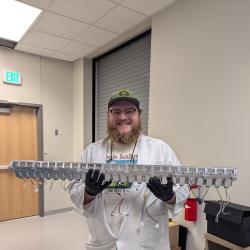Saving Energy with 'Personal HVAC Systems'
Two research teams from the University of Maryland are launching new federally-funded research projects designed to create personal technologies for keeping individuals comfortably cool or warm, while shrinking the energy needs of the buildings they occupy.
The UMD projects, which will receive combined funding of more than $5 million, are two of 11 projects supported through a new $30 million Advanced Research Projects Agency-Energy (ARPA-E) program titled DELTA, or Delivering Efficient Local Thermal Amenities. The program supports research to develop technologies that can regulate temperatures of building occupants, rather than of the overall building, dramatically reducing the building’s energy consumption and associated emissions.
"Maryland leads the nation in energy research and innovation," said Sen. Barbara Mikulski of Maryland. "These are smart investments in the most innovative early stage research that leads to new ideas, new products and new jobs. I’m so proud of the Maryland researchers leading the way in technologies that will make our nation safer and our economy stronger."
The Meta-cooling Textile project, led by Department of Chemistry and Biochemistry Associate Professor YuHuang Wang with co-principal investigators (co-PI) Associate Professor Bao Yang (mechanical engineering), Associate Professor Min Ouyang (physics) and Assistant Professor Liangbing Hu (materials science and engineering), will develop a thermally responsive fabric that extends the skin’s thermoregulation ability to maintain comfort in hotter or cooler office settings.
To provide cooling in hotter surroundings, the fabric's meta-fiber will increase its infrared emissivity and shrink to open pores in the fabric to increase ventilation. In cooler conditions, these effects reverse to increase the garment’s ability to insulate the wearer. The added bidirectional regulation capacity will expand the thermal comfort range, thereby lowering the heating and cooling requirements for buildings.
The Robotic Personal Conditioning Device team, led by Center for Environmental Energy Engineering Director and Minta Martin Professor of Engineering Reinhard Radermacher, with co-PIs Professor Jelena Srebric and Assistant Research Scientist Dr. Vikrant Aute, plans to develop a mobile platform to provide personalized cooling to individuals.
The platform will contain a small, battery-powered, high-efficiency vapor compression heat pump to provide localized air conditioning as needed during the day while dumping stored heat and recharging batteries at night. The highly portable nature of the platform and accompanying sensor and control system will allow it to be optimally placed to improve personal comfort and reduce the energy required to cool buildings.
"This project is a paradigm shift in how people stay comfortable in homes and buildings," said Radermacher. "This is mobile air conditioning in totally new context, not in the traditional sense of automotive air conditioning, but supplementing or substituting for traditional air conditioning."
Radermacher and his team envision a small, compact air conditioning unit that can follow the user and provide cool or warm air only where (and when) needed. This would increase energy efficiency by reducing the need to cool large spaces like offices.
ARPA-E is directed by Ellen Williams, a UMD Distinguished University Professor in the Department of Physics and the Institute for Physical Science and Technology, who is on leave from the university. ARPA-E advances high-potential, high-impact energy technologies that are too early for private-sector investment. ARPA-E awardees are unique because they are developing entirely new ways to generate, store and use energy.
Media Relations Contact: Abby Robinson, 301-405-5845, abbyr@umd.edu
University of Maryland
College of Computer, Mathematical, and Natural Sciences
2300 Symons Hall
College Park, MD 20742
www.cmns.umd.edu
@UMDscience
About the College of Computer, Mathematical, and Natural Sciences
The College of Computer, Mathematical, and Natural Sciences at the University of Maryland educates more than 7,000 future scientific leaders in its undergraduate and graduate programs each year. The college's 10 departments and more than a dozen interdisciplinary research centers foster scientific discovery with annual sponsored research funding exceeding $150 million.







